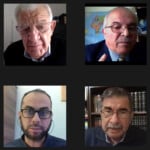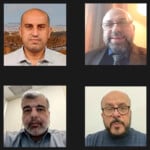Al-Zaytouna Centre for Studies and Consultations held, on 13/12/2022, a panel discussion entitled “Eastern Mediterranean Gas and Its Impact on the Regional Geostrategic Landscape” with the participation of a selection of experts specialized in political, economic and energy affairs. They discussed the impact of gas investment on the geostrategic landscape in the Eastern Mediterranean region, and the expected repercussions at the international and regional levels and on the relations between regional countries.
Al-Zaytouna General Manager Prof. Dr. Mohsen Mohammad Saleh made his opening remarks, stating that the objective of this panel discussion is to assess the future of eastern Mediterranean gas and its impact on the geopolitical regional scene. This issue has overlapping political, security, military, economic and legal frameworks, not to mention the regional and international entanglements. It cannot be read from one angle, rather the approach must be comprehensive, taking into account the higher interests of Arab and Muslim Ummah (nation).
First speaker, Dr. ‘Abdul Halim Fadlallah, head of Consultation Center for Studies and Documentation, stated that the discovery of gas in the eastern Mediterranean region has increased the strategic value of the region, especially after the outbreak of the Russian-Ukrainian war, and the increased need of Europeans for gas to compensate for the Russian gas. He added that the estimates of gas reserves in the eastern Mediterranean indicate that Lebanon owns about one thousand billion cubic meters. He added that the Middle East gas can cover about 60 to 65% of the Russian gas imported by Europe.
Fadlallah explained that there is a hypothesis that the energy struggle will continue for years to come. Hence, the gas file in the region is of high strategic importance for Europe and the US. He pointed out that Lebanon has promising potential for gas extraction, however, there are obstacles regarding marketing and exporting gas to Europe. For Lebanon refuses to join the East Mediterranean Gas Forum (EMGF) due to Israel’s membership, and in case the gas goes through Syria to Jordan, Iraq and Iran, it will face the problem of US sanctions on Syria (Caesar Act), not to mention the problem of the size and demand of Arab and foreign investment in the Lebanese market, in case Lebanon decided to establish its own gas liquefaction stations.
Fadlallah stressed the importance of consuming gas in the local Lebanese market, thus meeting local energy needs and preventing Lebanon’s depletion of hard currency, especially when Lebanon is living its worst economic crisis. He added that the gas deal will prevent Israel from attacking the infrastructure of Lebanon, due to the possibility of the resistance targeting Israeli gas fields. Fadlallah said that the resistance had an important role in completing the maritime demarcation deal, and that the deal preserved Lebanese interests without concessions, stressing that the gas is important, but it is not the only stability factor in the region.
The second speaker was Prof. Dr. Muhammad Ibrahim Miqdad, head of the Palestinian Economists Syndicate and professor of economics at the Islamic University in Gaza. He stressed that the eastern Mediterranean gas has political background in addition to economic ones. In Gaza, before 2000, the Gaza gas was discussed and there was an agreement with a British company to extract gas, but Israel intervened and blocked it. Now, and due to the war in Ukraine, there is desire to extract gas from Gaza in cooperation with Egypt. Miqdad said that the revenues of gas in Gaza must be used to support the collapsed economy due to the Israeli blockade and attacks, and that the extraction process depends on Israel’s obstructions. In case of gas extraction, Egypt will be the party that overlooks extraction, liquefaction and export processes.
Miqdad pointed out that due to schism, there are no clear Palestinian roles, and that unless the Palestinians obtain their rights, extraction will not take place. In addition, he believes that a share of the extraction revenues should be given to support the Gaza Strip economy, otherwise, the resistance forces in will not accept the completion of extraction. Miqdad called for the establishment of a Palestinian national institution that includes everyone, managing and monitoring the gas issue and benefiting from its revenues. Hence, having transparency in dealing with the issue, with no room for corruption and theft. Miqdad called on the Palestinian Authority to file a lawsuit at the United Nations to restore Palestinian rights and compensate Israel’s theft of Palestinian gas.
The third speaker was Dr. Wassim Qalajieh, writer on strategic affairs and expert in eastern Mediterranean gas. He saw that Israel took advantage of the eastern Mediterranean gas to consolidate its relations with Cyprus and Greece. Then there was the war in Ukraine, giving greater importance to the eastern Mediterranean gas, where Israel tried to take advantage of the situation and market itself as being able to compensate an important part of the Europeans’ need for gas.
Qalajiyeh said that US opposition was behind the failure of establishing a gas pipeline from the eastern Mediterranean to Europe, passing through Cyprus and Greece. For it would have repercussions on the relationship between the parties in the Mediterranean region, where tensions may occur between Turkey on the one hand and Cyprus, Greece and Israel on the other. In addition, the US saw that the project is not feasible.
Qalajiyeh said that common interests were the reason for the shift in the Israel-Turkey relations, where Turkey sought to be a station for exporting gas to Europe, and Israel’s interest was to secure its export of gas without having to clash with Turkey or contradict US desire. As for Qatar, due to its relations with the Lebanese, Palestinian and Israeli sides, it will be able to invest in the gas issue, whether in Lebanon or Gaza.
There were important interventions by a number of experts and specialists, Prof. Dr. Walid ‘Abd al-Hay; Prof. Dr. Anis Kassim; Dr. Khaled Fouad; Jamal Issa; Dr. Amin Hoteit; Dr. Ali Al-Baghdadi; Dr. Ahmad ‘Abdul Hadi; Wael Saad; Dr. ‘Alaa al-Dik; Muhammad Nassar; and Dr. Baha’ al-Ghul.
Their interventions included the following important points:
• Indicators show that the importance of the Mediterranean Sea in the future of Europe, China and the world is increasing.
• Gas would become increasingly important in the international energy market and in the foreseeable future, it will remain important.
• Competition between European and Mediterranean ports will increase.
• China is interested in the eastern Mediterranean gas, and will work on investing in it and influencing it.
• The Turkish-Egyptian competition over the gas and its liquefaction stations would continue.
• With respect to the Ukrainian crisis, the Europeans will not be able to replace Russian gas until 2027.
• The Arab-Israeli conflict will continue, and this will have an impact on the stability of the Mediterranean region.
• The size of the international reserves and the ability to export are still in favor of Russia.
• By extrapolating the factors affecting the future, the instability in the eastern Mediterranean region is high, reaching 63%, indicating that the chances of having new conflicts in the region are high.
• Israel is the most beneficiary (huge reserves). It is exploiting the current situation to maximize the size of stocks and its production and export capabilities.
• As for the maritime demarcation deal between Israel and Lebanon, what applies to the land borders cannot be applied on it. It does not affect Lebanese sovereignty.
Arabic
Al-Zaytouna Centre for Studies and Consultations, 14/12/2022








Leave A Comment